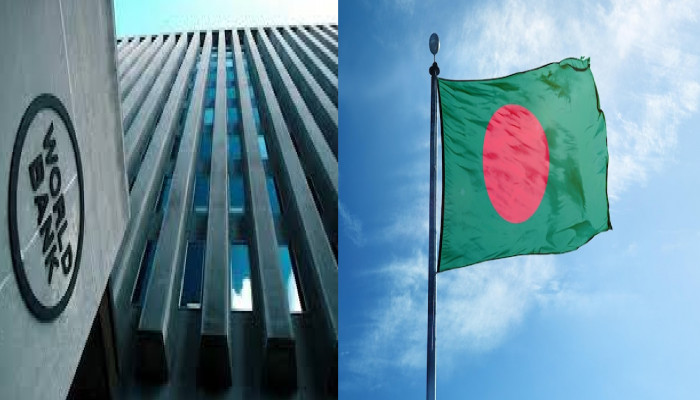World Bank grants $1.16 billion financing to Bangladesh for inclusive development
- In Reports
- 12:55 PM, Dec 20, 2024
- Myind Staff
The World Bank's Board of Executive Directors has approved three projects worth $1.16 billion to support Bangladesh in improving health services, water & sanitation and promoting greener, climate-resilient development, according to a statement released by the World Bank on Friday.
"Bangladesh is among the most vulnerable countries to climate change and faces the greatest pollution challenges. Improving climate resilience in every sector and tackling the pollution scourge has become a critical development priority," stated Abdoulaye Seck, World Bank Country Director for Bangladesh and Bhutan. "These new financing will bring to the people of Bangladesh essential services such as health and water and sanitation while laying the foundation for clean, climate resilient and sustainable development."
The Second Bangladesh Green and Climate Resilient Development Credit, valued at $500 million, aims to support reforms for the country's shift towards environmentally friendly and climate-resilient development. This funding backs policy changes to enhance public planning, financing and implementation of green and climate-resilient projects at both local and national levels. It also encourages cleaner and more resource-efficient production and services in important sectors. As a key requirement for this credit, the Planning Commission has adopted Multi-Year Public Investment Program Guidelines for key sectors, aligning them with the Medium-Term Budget Framework.
A climate-resilient and sustainable environment is also promoted by the funding, which also supports policies to lower air pollution, strengthen environmental enforcement, increase access to carbon markets, improve sustainable water and sanitation services, and boost the effectiveness of the Bangladesh Delta Plan 2100. The Planning Division has adopted the Delta Appraisal Framework in order to carry out the Delta Plan in an efficient manner. Additionally, the funding encourages environmentally and socially responsible public procurement. It will also encourage the construction industry to become more environmentally friendly and help increase the energy efficiency of buildings and appliances. The $379 million Health, Nutrition, and Population Sector Development Program-For-Results aims to improve access to quality health and nutrition services and strengthen health systems in Sylhet and Chattogram divisions. It will benefit around 5.1 million people by providing essential health, nutrition, and population services.
The program focuses on reducing maternal and newborn deaths by increasing the number of deliveries, including both normal and Caesarean sections, in public health facilities. Special attention will be given to vulnerable women in climate-affected districts. It will also enhance the healthcare system to address emerging health needs, such as screening and treating hypertension and other conditions. In addition to World Bank funding, the Global Financing Facility for Women, Children, and Adolescents (GFF) is contributing a $25 million grant. This grant will help prioritise key interventions like child nutrition, adolescent health, quality maternal and newborn care, improved data use and better coordination.
Over a million Chattogram residents will have access to clean water through newly constructed and renovated piped water connections due to the $280 million Chattogram Water Supply Improvement Project. About 100,000 people in low-income communities will receive better sanitation services, and roughly 200,000 new household water connections will be constructed. In order to provide Water, Sanitation, and Hygiene (WASH) services to approximately 100 million people in the region by 2035, this project is a component of the World Bank South Asia regional initiative or program of initiatives. The project will support the Chattogram Water Supply and Sewerage Authority (CWASA) to improve its efficiency and financial stability. It will tackle issues like water loss caused by leakage, faulty meters, and illegal connections. By installing new water meters and setting up 46 Smart District Metered Areas (DMAs), the project will ensure a reliable water supply, detect leaks, and track water usage in real time. It will also enhance utility systems, improve financial performance, and strengthen creditworthiness by developing a tariff plan. Additionally, CWASA's capacity for long-term planning, data and asset management, communication, and disaster preparedness will be improved.
After Bangladesh gained its independence, the World Bank was one of the first development partners to provide assistance. More than $45 billion in International Development Association (IDA) finance has been committed by the World Bank since then in the form of grants, interest-free loans, and concessional credits to assist the nation in addressing its development priorities. Bangladesh has been one of the biggest users of interest-free World Bank borrowing in recent years.







Comments